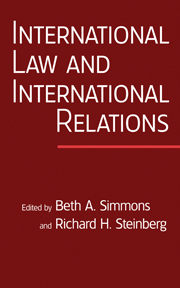Book contents
- Frontmatter
- Contents
- Contributors
- Abstracts
- Preface
- Editors' Note
- PART I INTERNATIONAL REGIMES THEORY: DOES LAW MATTER?
- PART II COMMITMENT AND COMPLIANCE
- PART III LEGALIZATION AND ITS LIMITS
- PART IV INTERNATIONAL LAW AND INTERNATIONAL NORMS
- PART V TREATY DESIGN AND DYNAMICS
- PART VI LAW AND LEGAL INSTITUTIONS
- PART VII OTHER SUBSTANTIVE AREAS OF INTERNATIONAL LAW
- 20 Security: Scraps of Paper? Agreements and the Durability of Peace (2003)
- 21 Trade: In the Shadow of Law or Power? Consensus-Based Bargaining and Outcomes in the GATT/WTO (2002)
- 22 Money: The Legalization of International Monetary Affairs (2000)
- 23 War Crimes: Constructing an Atrocities Regime: The Politics of War Crimes Tribunals (2001)
- 24 Human Rights: The Origins of Human Rights Regimes: Democratic Delegation in Postwar Europe (2000)
- 25 Environment: Regime Design Matters: Intentional Oil Pollution and Treaty Compliance (1994)
- 26 Intellectual Property: The Regime Complex for Plant Genetic Resources (2004)
- References
- Index
20 - Security: Scraps of Paper? Agreements and the Durability of Peace (2003)
Published online by Cambridge University Press: 05 June 2012
- Frontmatter
- Contents
- Contributors
- Abstracts
- Preface
- Editors' Note
- PART I INTERNATIONAL REGIMES THEORY: DOES LAW MATTER?
- PART II COMMITMENT AND COMPLIANCE
- PART III LEGALIZATION AND ITS LIMITS
- PART IV INTERNATIONAL LAW AND INTERNATIONAL NORMS
- PART V TREATY DESIGN AND DYNAMICS
- PART VI LAW AND LEGAL INSTITUTIONS
- PART VII OTHER SUBSTANTIVE AREAS OF INTERNATIONAL LAW
- 20 Security: Scraps of Paper? Agreements and the Durability of Peace (2003)
- 21 Trade: In the Shadow of Law or Power? Consensus-Based Bargaining and Outcomes in the GATT/WTO (2002)
- 22 Money: The Legalization of International Monetary Affairs (2000)
- 23 War Crimes: Constructing an Atrocities Regime: The Politics of War Crimes Tribunals (2001)
- 24 Human Rights: The Origins of Human Rights Regimes: Democratic Delegation in Postwar Europe (2000)
- 25 Environment: Regime Design Matters: Intentional Oil Pollution and Treaty Compliance (1994)
- 26 Intellectual Property: The Regime Complex for Plant Genetic Resources (2004)
- References
- Index
Summary
Why does peace sometimes last and sometimes fall apart? What, if anything, can be done to enhance the durability of peace in the aftermath of war? Some cease-fires fall apart within days or months, others hold for years, while others last indefinitely. Why, for example, did a cease-fire in the Arab-Israeli war in 1948 fail within three months, while the next one lasted for years? Why has peace so often faltered between India and Pakistan but held, despite ongoing tensions, between North and South Korea? Surprisingly little theoretical or empirical work has explored this important question.
States have devised a number of mechanisms to try to make it easier to maintain peace. These mechanisms are often implemented as part of a cease-fire agreement. States set up demilitarized zones, accept international peacekeeping missions, establish dispute resolution procedures, sign formal agreements, and undertake other steps to try to enhance the prospects for peace. Do these measures work? If so, why? This article begins to answer this question by analyzing the duration of peace after international wars ending between 1946 and 1997. It draws on and develops theories of international cooperation to argue that measures such as these help enemies overcome the cooperation problem inherent in the aftermath of war. Students of international relations have long drawn on contracting theory and the new economics of organization literature to examine how actors can achieve cooperation even as anarchy makes it impossible to write enforceable contracts.
- Type
- Chapter
- Information
- International Law and International RelationsAn International Organization Reader, pp. 515 - 542Publisher: Cambridge University PressPrint publication year: 2007



